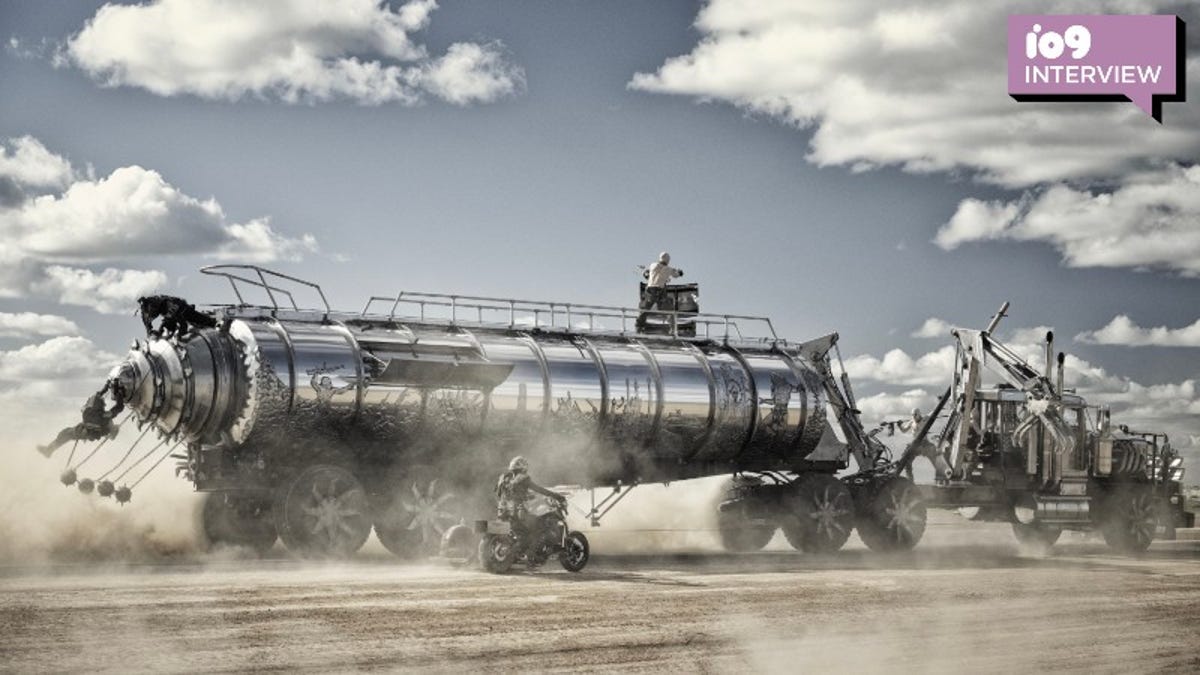“In Fury Road, in [Furiosa], there are hardly any shots that haven’t been manipulated digitally,” Miller told io9. “For instance, changing the sky. When Steven Spielberg shot Jaws, the sea was changing all the time. If you look at that film one moment it’s choppy, one moment it’s flat. You don’t need to do that anymore.”
So basically every shot in both Fury Road and Furiosa has some kind of digital changes to it. But, for the most part, it’s subtle stuff. The Furiosa scene Miller pointed to was “The Stowaway,” one of the film’s middle chapters and also its longest, most sprawling action sequence. In it, Furiosa (Anya Taylor-Joy) tries to escape the Citadel but instead finds herself in an epic battle versus a group of Wasteland pirates.
“When you’re doing extended sequences like ‘The Stowaway’ sequence, that was shot over 78 days. It’s a 15-minute sequence but the skies are consistent,” Miller said. “So we took what we thought was a good sky and we can reproduce that sky right through the story. So some shots have the real sky because the real sky looked really good. But in the next shot, it might have been where it was a completely different sky so we were able to match that. You can do that.”
The film clearly has other digital effects too but Miller is mostly a fan of the ones that are invisible and keep everything smooth and cohesive. It’s a huge game-changer. “If you were shooting Jaws again today, the sea would be consistent,” He said. “Even meticulous filmmakers, guys like David Lean when they shot Lawrence of Arabia—obsessively, meticulous with their camera and lighting and so on—you can see where they shot different times of day and so on. You can avoid it now to some degree. It’s a much smoother experience.”



See I take the opposite message away from this. The point is, it doesn’t have to be perfect in order to be masterpiece cinema or accomplish the goal.
Great paintings can have brushstrokes. It doesn’t need to look photorealistic to what the thing looks like; in fact you could make the argument that’s counterproductive. Great video games have constrained mechanics; you can’t do everything “realistic,” and in fact the pursuit of hyper realism seems etc etc you get the point.
Maybe I’m oversimplifying what he’s saying, and he just means that the craft of movie making is now easier and we can eliminate some detail-focused bullshit that used to create logistical problems with shooting… but it sounds more to me like “and NOW we can sink millions of dollars into fuckin around with the background of the shots and that’ll finally fix what was wrong with Jaws and all the movies now will be better than Jaws as a result” which sounds like totally missing the point if that’s what he’s saying.
He is saying that through vfx the whole experience can be more consistent.
You can eliminate stuff that takes you out of the movie like the sky or water changing from shot to shot. It is more immersive that way.
And I’m saying consistency is not the goal. Was Jaws not immersive?
Consistency is one of the goals. That is why there is a person on set whose whole job it is to keep stuff consistent between takes.
Every time I see clothing/stance/water/sky change between shots it reminds me that I am watching a movie which in turn kills my immersion.
If you would take jaws the way it is and just change the inconsistencies it would be a better movie. Doesn’t mean it isn’t a good movie now.
Well in did get my leg bit off in the cinema.
“… I got better.”